We Don't Deserve Michelle Yeoh
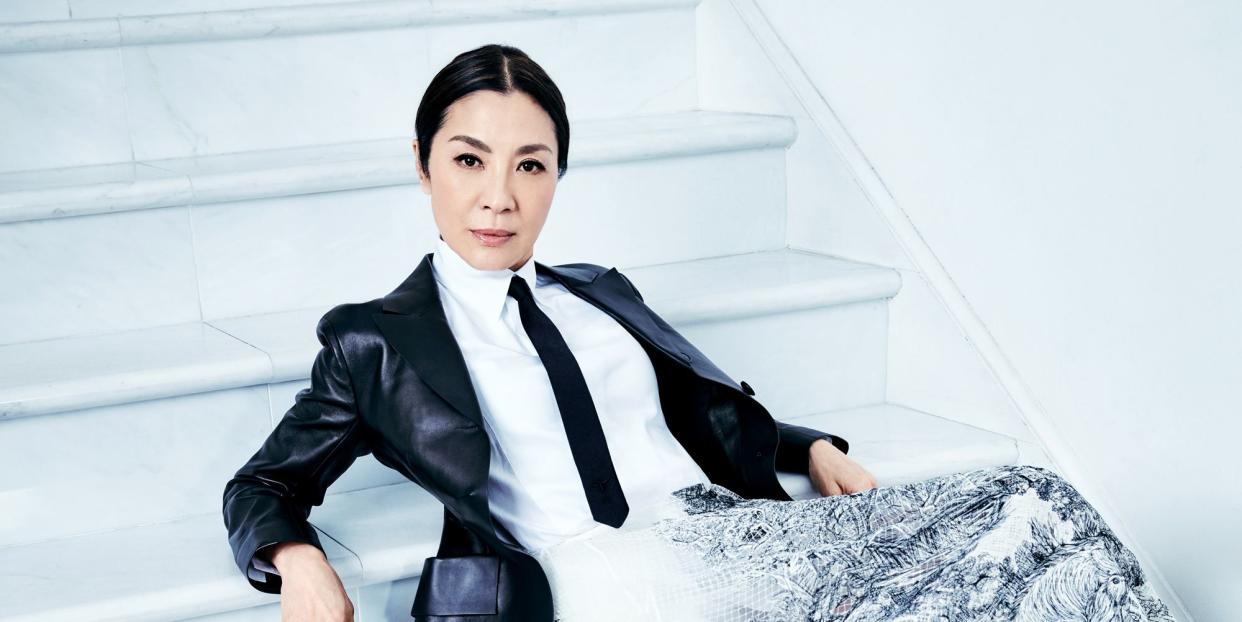

Every Malaysian I know has a precise, detailed map in their head: a culinary topography, marked with the best curry noodles in the night market or where the freshest satay comes spitting off the grill. In Michelle Yeoh’s home town of Ipoh, locals might argue over who makes the silkiest tofu curds or expound on which vendors serve the best of the city’s signature poached chicken with bean sprouts. In that part of the world, food represents respect and love; it’s close to a religion.
Yeoh and I, both Malaysian, understand this. We know what’s important-and that’s lunch. So I sit quietly as Yeoh, looking marble-perfect, surveys a different culinary landscape altogether: the BLVD Lounge in the Beverly Wilshire Hotel. All around us, the day’s lunch crowd is buzzing: a family the size of a small army attack their burgers; two businessmen, their suit jackets slung to the side, laugh over the remains of a long work lunch; an older man in a jaunty hat and a model contoured to Instagram perfection sip on wine.
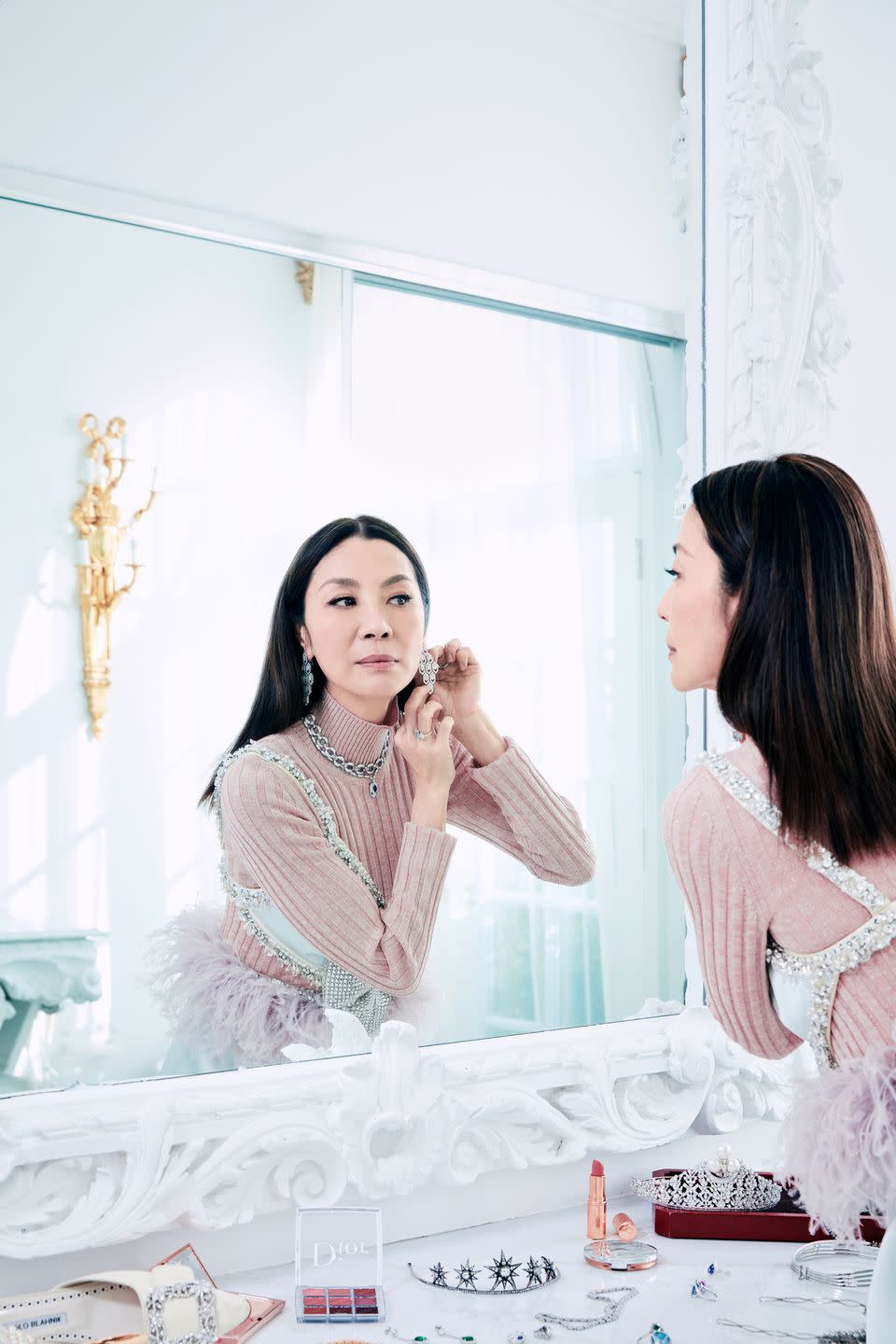
And then there’s Yeoh in the middle of it all, eyes stalking the waitstaff from her perch at our table. “I’m always hungry,” she says, unmoving, except for a brief, twinkling glance in my direction. “It’s a Malaysian thing.” She doesn’t say anything more. She knows she doesn’t have to explain herself to me.
If you’ve seen Crazy Rich Asians, you know what one look from Yeoh can do. It can make you long for her approval, and devastate you when it doesn't come. It can be warming or withering. It can feel like the end of the world. Now, it must feel laser-sharp, because our waiter suddenly turns around, meets Yeoh’s eye, and bustles over to our table. He takes our orders and sweeps back to the kitchen. Yeoh settles back into her chair, smiling. Now everything’s as it should be.
Pop culture has yielded many iconic moms, but in playing Eleanor Young, Yeoh-56 years old, and a Leo, obviously-became the face of a new, terrifying kind of cinematic mother. The Young matriarch is a glamorous, exacting disciplinarian. She knows you could achieve greatness-but that you aren’t there yet. She’s a swift and unsentimental judge, quick to point out when you’re falling short. She expects as much from you as she’s given you herself, which is everything. That is, she’s a stereotypical Asian mom, a cultural archetype, yet one that has seen few iterations in Hollywood.

On its face, Crazy Rich Asians is about a young woman falling for a bachelor, finding out he’s loaded, and struggling to fit into his world. Eleanor represents the guards at the gate, the barrier to entry. But to call her a villain would be an oversimplification. The movie’s extremely satisfying opening scene, in fact, belongs to Eleanor, introducing her as a fierce protector of her family’s honor. (She buys a hotel that refuses to accommodate them, no big deal.) For Eleanor, marrying into the revered Young family meant devoting herself to their needs, especially those of her son, Nick (Henry Golding). Having sacrificed her own happiness to ensure Nick ends up the favorite, Eleanor holds strict ideas about who can follow in her self-abnegating footsteps. And Nick’s spirited Chinese-American girlfriend Rachel (Constance Wu) ain’t it.
Eleanor’s demanding standards create and control the movie’s emotional weather. And she owns the film’s most startling moment. After a seemingly delightful afternoon of making dumplings, during which Rachel gets to know Nick’s close-knit relatives, Eleanor and Rachel run into one another on the grand staircase of the Young family home. After a brief tête-à-tête, Eleanor gently touches Rachel’s face and says: “You will never be enough.”
You couldn’t pay someone to ruin you more completely.
Yeoh's performance turned that gesture into a gut-punch. “I just went and touched her face,” she says, “and when they called cut, everybody went...” She puts her hand to her chest and lets out a sharp gasp.
“I’ve never had this conversation with Constance, but something definitely intimidated her every time,” says director Jon M. Chu. “Constance couldn’t get through the scene because she would just break down and cry. It was just so brutal. They’re just words! It’s crazy.” Twitter self-flagellants were also in awe of the fierce put-down. "Imagine having Michelle Yeoh telling you you'll never be enough,” wrote one. “I would instantly die.”
“I used to have my own voice in my head telling me I'll never be enough,” wrote another, “but at least now it's Michelle Yeoh's.”
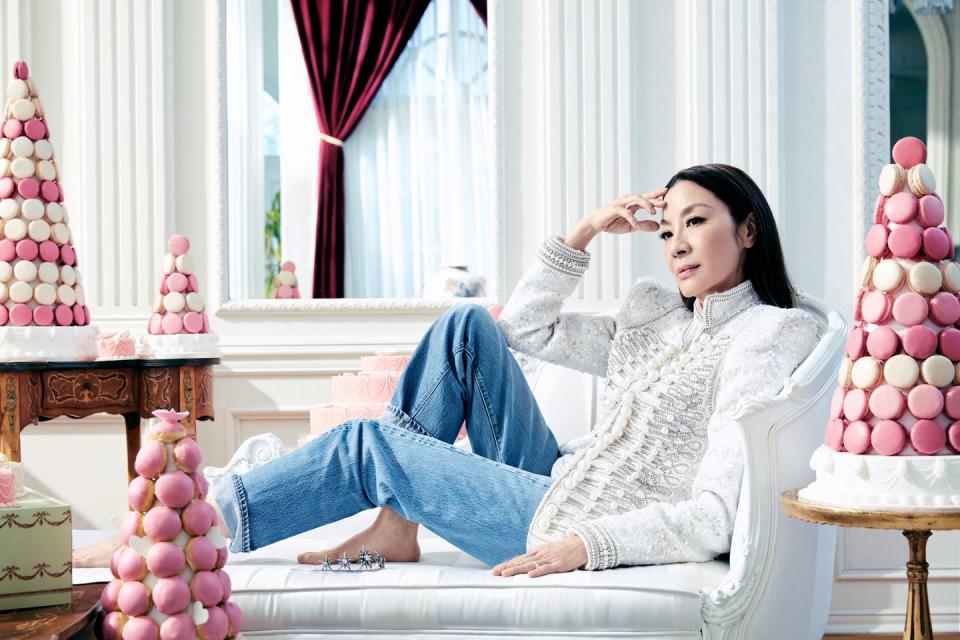

I read some of these gasping, semi-erotic plaudits out to her over our salads. Yeoh is bemused but game-and then I get to one about her Star Trek: Discovery character. For the uninitiated, that’s Emperor Philippa Georgiou, a sword-wielding ruler partial to dominatrix-adjacent leather suits. She's so popular she’s getting her own CBS All Access spin-off. I read this particular tweet with a frisson of worry. Will this immaculate swan of a woman understand the internet’s horny vernacular and take it for the affection it is? “‘I want Emperor Georgiou,’” I say, “‘to step on me.’”
Yeoh snaps her head back and releases a full-throated cackle of astonishing volume. She throws a starched napkin over her face, but it does nothing to muffle the sound. It lasts for several seconds and seemingly fills the room. Eleanor Young would never.
The tweet has the same cackle-inducing power over Sonequa Martin-Green, Yeoh’s Discovery co-star. “These are the same sorts of jokes that we have around set,” she explains over the phone. “I'm not going to disagree with Michelle, because she'll kick me in the face. Obviously she never would, and that's why we're able to joke that way. She couldn’t be more loving and jovial.”
Martin-Green and Yeoh were the first two women of color to take the helm in a Star Trek franchise. That shared achievement has grown into an almost familial bond: On set, Martin-Green calls Yeoh “mother,” and Yeoh calls her “daughter.” They’ve held each other during long hours shooting in Jordan, where early Discovery scenes were filmed. They’ve peed behind shrubs in the Bedouin Desert after the production’s Port-a-Potties didn’t arrive, and they still laugh about it today.
Growing up, Martin-Green learned about “powerful women who were fighters” from her own mom, who introduced her to Yeoh’s early action movies. So when Martin-Green first met Yeoh, who had cut such an intimidating figure in her mind, she was struck by how warm she was in person.
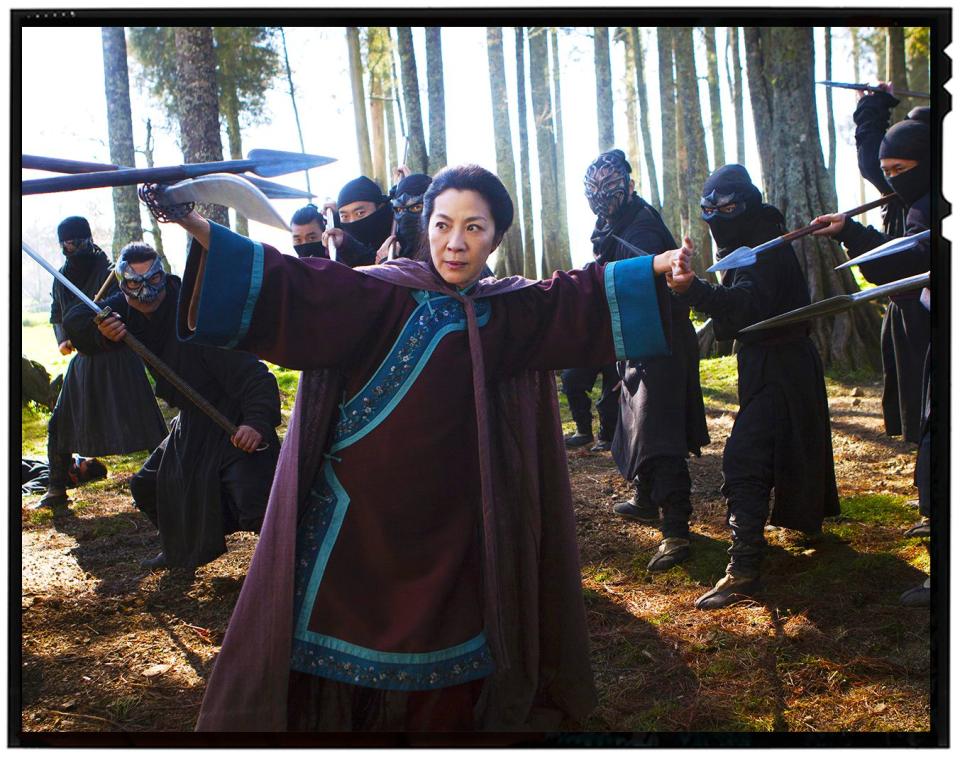
What didn’t surprise her was that, simply put, Michelle Yeoh kicks ass. Several supercuts of Yeoh’s fearsome fighting scenes recently made the rounds on social media. Two swords in hand, she backflips her way through Reign of Assassins. She switches between weapons without losing a breath in Crouching Tiger, Hidden Dragon. She’s doing the air-splits in Supercop. “Oh, the scorpion kick,” says Yeoh of her signature move in Yes, Madam, like it’s the Macarena or something.
A pageant queen and former ballet dancer whose career was derailed by a back injury, Yeoh was always “very physical.” The actress still does her own stunts: That’s all her in Star Trek. But when she appeared in Yes, Madam, her first action role, she had never studied martial arts. To get her up to speed, the production company set her up with an martial arts expert. But he lacked, she puts it generously, a teacherly bent. “He'd be like, ‘Just do it,’” Yeoh says now, still incredulous. “‘What do you mean, Just do it?’”
So she self-guided her own training, spending hours a day in the gym and getting to know the stuntmen. “They were curious,” she says, and they saw the former Miss Malaysia as an oddity, trying to psych her out with intense workouts and advanced moves. Thanks to Yeoh’s ballet background, though, she was flexible and strong. She kept going. They stopped playing games.
Soon, crowds would gather to gawk at Yeoh on set, which only made her more determined to wow them. “I think when you're young, you're like, ‘What have I got to lose?’" That “why not?” attitude led to one of her most skeleton-rattling stunts: In Supercop, Yeoh played Interpol inspector Jessica Yang, a supervisor on police officer Ka Kui’s (Jackie Chan) mission to infiltrate a drug organization. During the film’s climax, she jumps a moving motorbike off a bridge and onto a train speeding underneath. A normal person shouldn’t do that kind of thing. Even an action star shouldn’t do that kind of thing.
“Those were insane times,” she says. “I was empowered by the fact I was so fit. I was doing all these crazy, fun things, and people were astonished.” When she revisited the movie to dub the English dialogue, though, she was aghast. “I went, What the hell was I thinking? There were a number of times that it all could have gone tremendously wrong.” In a twist of fate, she’s now an ambassador for road safety in Malaysia. When I bring it up, she laughs. “Well, don't do what I do on screen, okay?”
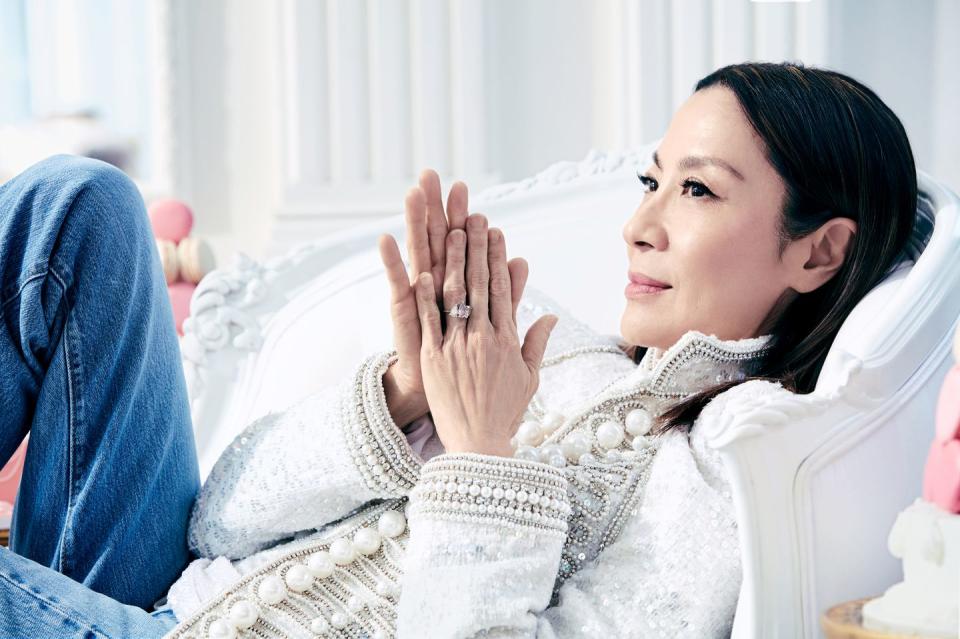
Yeoh’s career has been unusual, to say the least. Nothing like it existed before her. Her ex-ballerina’s grace, sheer physical power, and subtle stoicism made her a superstar in Asian cinema, particularly in the action genre. But her crossover into Hollywood was more fraught. “When I first came out here, honestly, there was no regard for Asian actors,” Yeoh says. “They were like, ‘Oh, you speak English!’” For years, Yeoh was billed as Michelle Khan, a stage name selected to sound racially ambiguous. On movie posters, she would sometimes appear as a woman of indecipherable ethnicity, her likeness so reworked that it was essentially a cartoon. Once, Yeoh saw one and asked, “‘Whoa, what movie is this?’ And they said, ‘That’s your movie.’”
Still, she scored major roles in what would become blockbuster hits in America: Colonel Wai Lin in Tomorrow Never Dies, a Bond girl whose combat prowess gave Pierce Brosnan’s 007 a run for his money; geisha doyenne Mameha in Memoirs of a Geisha; and the loyal, poised fighter Yu Shu Lien in Ang Lee’s wuxia epic Crouching Tiger, Hidden Dragon. But while Crouching Tiger remains the highest-grossing foreign-language movie in American history, it didn’t result in instant stardom for Yeoh or its other Asian stars.
Landing Tomorrow Never Dies did, however, allow Michelle “Khan” to exit stage left. Yeoh has used her birth name ever since. “After that, it was like, You know what? My name is not so hard.”
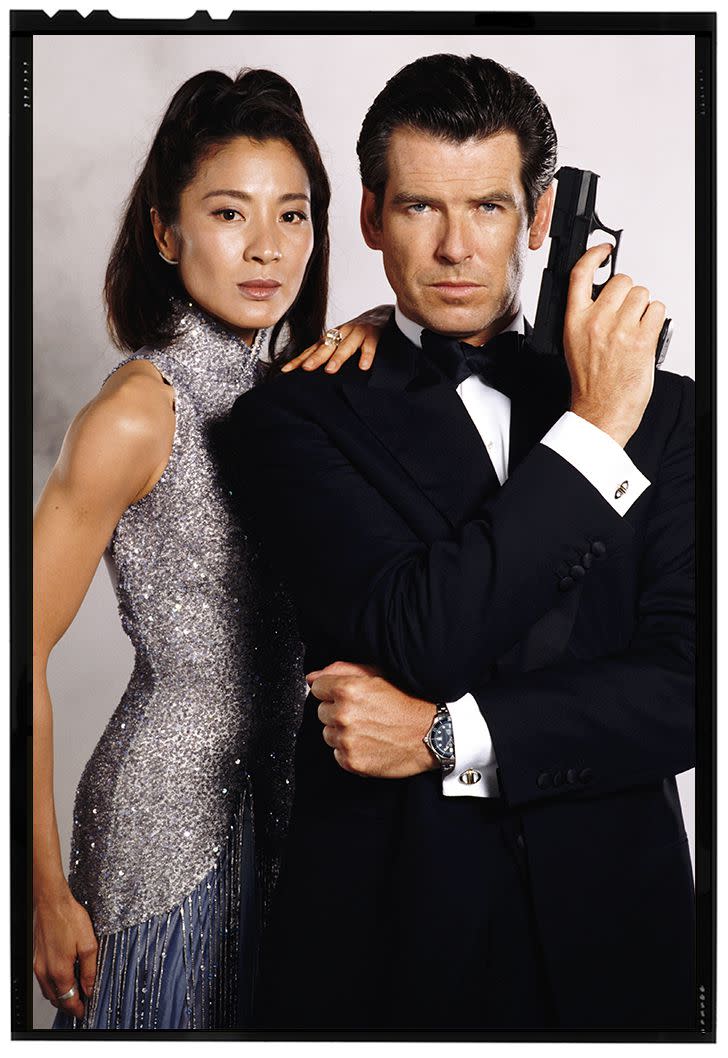
From early on in the development of Crazy Rich Asians, everyone from Chu to the book’s author Kevin Kwan and executive producers Nina Jacobson and Brad Simpson wanted Yeoh to play Eleanor. “It was sort of like, No duh,” Chu says.
Yeoh could project the power, elegance, and intelligence Eleanor required. But more than that, as one of very few Asian actresses to enjoy a long career in Asian and American markets, she held an almost talismanic importance for the first Hollywood movie with an all-Asian cast in 25 years. (The last was 1993’s The Joy Luck Club.) “We could ask anyone on our cast,” Chu says. “They were all inspired by her to come into this business.”
Yet in the wake of Crazy Rich Asians and its wild success, some wondered where Yeoh had been for the last 20 years. And when you tremble at her steely, flawless performance as Eleanor, it’s tempting to ask: Why isn’t Michelle Yeoh a bigger star? As Chu has said: “She should have much more recognition. She should be on the same level with a Meryl Streep.”
“I don’t think about that,” Yeoh demurs when I ask about it. She’s grateful for what she’s been able to achieve. “Maybe it’s because I'm Chinese-I like to please the people around me. But you don't sit there and think about it.” What Yeoh knows better than most is that until the runaway box-office success of Crazy Rich Asians, Hollywood stardom has been virtually impenetrable to Asian women. But for a new generation of Asian actresses working in Hollywood-think Lucy Liu, Constance Wu, Awkwafina, and Greta Lee-perhaps it’s that much easier to break boundaries when Yeoh has taken a whack at them first.
Crazy Rich Asians benefited from Yeoh’s rich experience. She had plenty of opinions about Eleanor, from her motivations and actions (the character is much more nuanced than the frantic, icy antagonist of the book) to what color the lanterns in her garden should be (red, not white, which in Chinese culture symbolizes death).
But one behind-the-scenes tweak, care of Yeoh, has attained legendary status. Eleanor’s engagement ring, featuring a gargantuan emerald nugget flanked by two diamonds, plays a crucial role in the film. Chu originally wanted an emerald ring modeled after one that John F. Kennedy had designed for Jackie, an ornate, jewel-encrusted honker. But the version ginned up by production didn’t meet Yeoh’s standards.

“She just took two seconds,” Chu recalls. “And she said, ‘No, that's not the ring.’ We were like, ‘Oh, uh, yeah, well...what else do you have?’” Like a genie, Yeoh supplied one of her own baubles: the very rock you see on screen. It’s massive, which will come as no surprise to anyone who’s seen Yeoh dripping in diamonds and emeralds on the red carpet. It looks like you’d have to sell a small country to buy it.
“I believe in treating yourself,” Yeoh explains when I ask about the bling, which came from an Aladdin’s cave of treasures belonging to a jeweler friend. “I believe that things should speak to you, and when I saw that stone, it was like love at first sight.” A grin spreads across her face. “Then I thought, Shit, maybe I should ask how much it is.”
Her folly was the movie’s windfall. “I felt like this was the Eleanor piece,” says Yeoh. “It's recognizable, but it's so simple. It's not a big name, it doesn't come from a particular brand.” But its extravagance stressed out everyone on set. “The producers were more worried than I was,” she says, laughing. “I said, ‘It's already insured, don't worry.’”
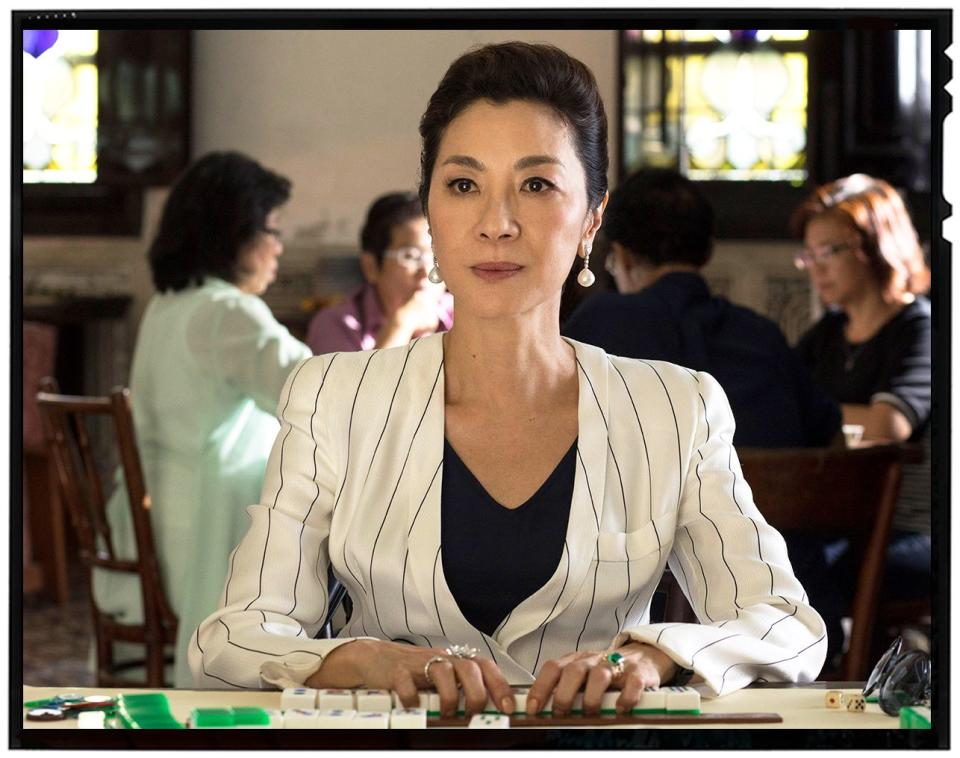
Yeoh’s jewelry is kind of a signature. “I love my jewels,” she says. “When I used to live in Hong Kong, my friends and I would play Mahjong”-the Chinese game that plays a pivotal role in the movie-“and we would wear all our rings, all our bracelets, and go like this.” She swirls her hands around as if she’s shuffling tiles on the bright green felt of a playing table, imagining the tornado-meets-windchime clacking of precious stones and glittering metal. Then her head goes back, and there’s that boisterous laugh again.
As if by conjuring, Yeoh spots Crazy Rich Asians author Kevin Kwan ensconced in another corner of the restaurant. When our time comes to an end, she gets up to greet him. But she’s concerned; my plate isn’t empty. “You didn't get to eat!” she says. I assure her I’ll finish every last bite before I go. “Okay, good,” she says, squeezing my shoulder gently.
It’s what Eleanor Young does when she sees Nick for the first time-makes sure he’s fed. It’s what she does when she hand-rolls dumplings with her family-pays respect to tradition and propriety. And I think it means the same thing coming from Michelle Yeoh. She knows how important it is.

('You Might Also Like',)

